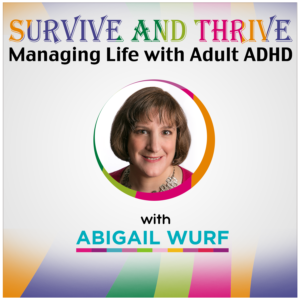 Find past episodes of the show below and be sure to subscribe on iTunes so you never miss an episode.
Find past episodes of the show below and be sure to subscribe on iTunes so you never miss an episode.
Everybody Has Something, You are Not Alone
 Often when I am giving a talk, I start with the fact that everybody has something. Some problem, issue, disability or other thing that gets in their way of being as successful as they wish to be. I start with this fact because we can sometimes get “precious” about our difficulties.
Often when I am giving a talk, I start with the fact that everybody has something. Some problem, issue, disability or other thing that gets in their way of being as successful as they wish to be. I start with this fact because we can sometimes get “precious” about our difficulties.
A great example is when you hear people trying to top each other on who has the corner market on bad or difficult things going on. Or when co-workers get into one-up-man-ship on who has the most work, worst boss and/or the least amount of time.
It is human to complain or maybe dwell a little in our difficulties. But when one starts thinking that there is some benefit to being the most burdened – compassion, listening and ownership can get lost. We can also develop a mental crutch. “Oh I can’t do that because…” or “People like me struggle more than people like you.” You don’t know you can’t do something until you try it. And you never know if someone is struggling more than you even if they don’t appear to be.
You just don’t know. I struggle with chronic pain due to surgery I has many years ago that failed and exacerbated a back condition I already had. I actually woke up from surgery and could not really walk which I had been able to do prior to the surgery. On the outside I looked fine because pain is pretty much invisible. Sometimes when I took public transportation and sat in the disability seats, I would get disapproving looks or comments about how I shouldn’t be sitting there.
This was hard because it was not as though I wished to sit there, actually I felt defeated sitting in those seats but walking to the back of the bus or metro when it was moving and standing when it was moving was extremely difficult for me.
When someone would ask if I needed help they often began comparing their difficulty with mine, “Well if you think that’s bad, I have…” I hated these conversations and would simply respond, “I am sorry you are suffering” or “I hope things get better.” Because I knew it was fruitless to get into game of woe.
Everybody has something whether you can tell or not. That is why the phrase “invisible disabilities” came into use. ADHD is an invisible disability, chronic pain is an invisible disability, diabetes is an invisible disability and I could go on. The point is unless you have walked in another’s shoes, you simply don’t know what they are dealing with.
Let’s be gentle with each other, compassionate and not start those games of who has it worst. If you need help – ask. If you think you can help someone – offer. But let’s lose the game of who is more “special.” We are all special and we are all struggling with something. Degree shouldn’t and doesn’t matter. There will always be someone who is worst off than you and someone who is better off than you. That’s life. Let’s focus on the positive and lose the “preciousness.”
Managing ADHD, Impulsivity and Money
 Many of those affected by ADHD have impulsivity issues. Combining impulsivity and money is a dangerous mix. I have heard stories of spouses with ADHD going out on their general errands for the day and coming home with a new car unexpectedly without any input from their partner, just a spur of the moment acquisition.
Many of those affected by ADHD have impulsivity issues. Combining impulsivity and money is a dangerous mix. I have heard stories of spouses with ADHD going out on their general errands for the day and coming home with a new car unexpectedly without any input from their partner, just a spur of the moment acquisition.
We think my Dad might have had ADHD. We don’t know for sure but before I was born my parents moved to Washington DC from New York and my dad went out and bought a house without really consulting my mom. The house was probably a great investment if they had been able to keep it but it was completely impractical for their needs at the time. So they ended up selling it fairly quickly.
One could argue that it would have been a great investment on paper but the house didn’t fit their lifestyle realities. For example, my father had polio that affected one of his legs. The house he bought had a spiral staircase that was difficult for him to get up and down. Furthermore, there was no way he could have carried my brother, who was a baby, up and down those stairs safely.
I find that many of us with ADHD can make impulsive financial decisions that can appear smart but in practicality are not. We also are great at arguing why the expenditure was smart afterwards.
Many of my clients when they start working with me, are deeply in debt, mostly with their credit cards. Some go to extremes to solve their credit card problems by cutting up their credit cards or freezing them in a block of ice in the freezer. The idea being that they have to wait for the ice to melt before they can get to their credit card and that time delay will stop them from being impulsive.
I don’t support these methods for a couple of reasons. First off, you don’t need your physical credit card to buy things now on the internet or by phone. Second, slowly many places are stopping taking cash like automated parking garages. In addition, such methods can cause inconvenience in other ways.
So what to do? How can those affected by ADHD manage their money in spite of their impulsivity?
I believe in setting rules and assumptions that slow you down or make you pause. For example, maybe you set a limit how much you can charge on your credit card in the moment. Meaning, for example, you can’t spend more than $100 in the moment. That you have to walk away and come back to it after say 24 hours before you can act on any expense over $100.
This pause in behavior can be helpful because it can get in the way of the impulsivity energy high you might feel in the moment to buy or spend. It also gives you time to run the idea by someone else and get their input.
Another rule may be that once you get your paycheck, the first thing you do is pay the bills from it before the money goes into your general spending account. That includes paying off a set amount of debt.
Another rule could be that you never let the debt go over a certain amount – an amount that is below your credit limit. It can also be helpful to make sure you look at how much interest you are paying each month and not allow yourself to ignore that number. It is just throwing money away.
I have found it very helpful to automatically have money deposited where it is not easily accessible monthly to build up an emergency fund or savings account. When I worked for a non-profit right out of college I was paid really little. But I arranged that $50 out of every paycheck be set aside. Since I never saw it in my checking account it didn’t really exist in my mind. I never missed what I hadn’t seen. $50 a pay period wasn’t much, but when I was laid off it was certainly helpful that that money had been put aside.
Now that I own my own business, I don’t get a paycheck from someone else so I have arranged for money to be withdrawn and added to my investments every month at the beginning of the month so I don’t ever feel I had that money to spend.
Rules are simply a way to manage your behavior, slow you down before you act. We, with ADHD, tend not to think too much about the future but the future costs money. Living to your financial limits monthly does not set you up for you future. Nor does it prepare you for emergencies, which you will have. Emergencies tend to cost money.
If you haven’t started yet, start now, putting aside some money for emergencies that is hard to get to. Also, create some rules that will interrupt your impulsive financial moments. That interruption could make the difference in how you manage your money day to day.
My Secret Fear
 I told one of my clients a secret that I don’t think I have ever shared with anyone. I don’t even think my family is aware of it. Actually to be honest, it is a secret fear, a ridiculous one but none-the-less a very real one to me.
I told one of my clients a secret that I don’t think I have ever shared with anyone. I don’t even think my family is aware of it. Actually to be honest, it is a secret fear, a ridiculous one but none-the-less a very real one to me.
Occasionally this client, who has also become a friend, comes to her sessions with me after grocery shopping and I let her put in anything that will spoil in my fridge during our session (she does double sessions so she is here for 90 minutes instead of the regular 45 minutes) so she has seen the contents of my fridge more than once.
When she saw that I always have a lot of eggs on hand she offered to pick up some organic eggs when she goes to the farmer’s market on the weekend. I told her not to bother but being the kind person she is, she insisted it would be no bother.
It was at this point I had to either be rude or reveal my long held secret. Owing to the fact that this client/friend is such a special person, I went with the truth and it has set me free. I am scared of cracking open organic eggs. Actually, I am even a little nervous cracking open eggs in general.
My fear is that I will find a dead baby chicken. Just thinking about that gives me the willies.
Why am I nattering on about all this?
We all have fears that we are, yes, fearful of revealing because they make no sense, are not logical or would not hold up under examination in terms of consistency of actions, thoughts or beliefs.
This is OK. They don’t have to make sense.
Also, we don’t have to be talked out of them by some “helpful” person. Granted it is not great to hold on to erroneous information or be trapped by fear. If the issue has no great impact on how you interact with the world, meaning it is not detrimental to moving forward in your life, what does it matter if I am scared of organic eggs?
Now, if I was scared to fly or go to a hospital that would be another matter because it would inhibit me from getting medical help in an emergency or getting across country to say good by to a dying relative who has little time.
Sometimes having little peccadillos, oddities, or benign fears simply contribute to who we are and/or reveal more about us.
So maybe when you come across a person who has a silly fear of organic eggs, instead of trying to logically talk them out of that fear, think about what that fear may reveal about them. It may even give you insights to positive attributes about the person that up to that point you had not discovered.
What does being scared of an organic egg might me about me? What might your little odd fears mean about you? What can information like this teach you? How is it that some weaknesses actually reveal strengths?
How to Get Accommodations at Work Without Telling You Have ADHD
 Sometimes to be more successful at our jobs we need a little support but don’t want to reveal we are affected by ADHD. A way to manage this is to tie our requests with increased productivity. Supervisors and bosses love increased productivity. At least most do!
Sometimes to be more successful at our jobs we need a little support but don’t want to reveal we are affected by ADHD. A way to manage this is to tie our requests with increased productivity. Supervisors and bosses love increased productivity. At least most do!
To go about this figure out why you are struggling at work. Try to get clear on what specific changes would improve your productivity and success at work. Try to find the most benign solutions possible – meaning causing as little disruption as possible at your work place.
For example, let’s say your job is full of long-term projects and you are finding it difficult to complete them on time. In this case maybe it is a matter of presenting to your boss or supervisor a plan of when you are going to do what and tie the deadlines to check-in meetings that are brief but puts the pressure on you to get the project done in increments instead of one long slog.
Let’s say you struggle with focusing at a job with an open floor plan layout. A possible solution is to ask if you can use the conference room when not reserved to be able to have a non-distracting and quiet environment.
Another way to increase your productivity if you are struggling to get your work done is to find an accountability partner. Someone you check in with and state what you are going to accomplish and when. Commit to it. You can reciprocate to your partner because it can help a lot of people get their work done more efficiently when they are in regular contact with their accountability partner. I have one and I talk with her every Monday morning.
The best solutions are ones that inconvenience people the least but have a high return on productivity and completion of your work. Think about ways that can help you solve some of your struggles at work and try to find a solution or support that is minimally intrusive to your boss.
Taking Risks Versus Impulsivity
 I used to think that most people affected by ADHD were all risk takers. I think I was confusing risk taking with impulsivity.
I used to think that most people affected by ADHD were all risk takers. I think I was confusing risk taking with impulsivity.
It is important to learn to take some risks in life because taking risks stretches you and that is important. I think of it in terms of my previous career as a dancer. We had to stretch out each day before rehearsal or class to be able to get moving well and resist injuries. Of course this didn’t always work but for the most part was effective.
I think taking risks is a mental way of stretching that is important because it also gets us moving and prevents injuries for the most part. Living a life without stretching can inhibit us from stretching in the future. We can begin to live a very narrow life that makes it harder, if the opportunity comes upon us, to stretch ourselves. What often happens is we don’t take the opportunity.
This is not to say take careless risks or take risks at every corner but to take risks where the opportunity presents itself and the downsides are few while the upsides are many.
To maintain muscles you must use them or they atrophy. Not ever taking risks will cause a part of you to atrophy. Use risk taking as an opportunity to challenge yourself and grow.
Even if the risk proves not to have been a good one, you still will have exercised your ability to take risks. In addition, you will have added to your arsenal on how to evaluate what risks to take.
This is different from impulsivity where there is no thinking involved, just acting. Think before you take a risk, that is why I believe we have the term “a calculated risk.”
Is there a risk opportunity presenting itself in your life right now? Ask yourself:
- Is there more to gain than lose if I take the risk?
- If I lose, can I afford that lose?
Those questions are the key questions as to whether or not to take the risk.
Do You Have Limiting Beliefs?
 Do you have limiting beliefs about yourself? Most of us probably do and most of us probably don’t even realize that we do. Limiting beliefs are beliefs that cause us to live at “less than” our true potential.
Do you have limiting beliefs about yourself? Most of us probably do and most of us probably don’t even realize that we do. Limiting beliefs are beliefs that cause us to live at “less than” our true potential.
Aside from being an ADHD coach, author and speaker, I fall under the classification of entrepreneur. I work for myself, am responsible not only to my clients but to support myself and pay the people I hire to help me out. Basically the buck stops here.
A lot of the things I am learning as an entrepreneur transfer into helpful insights regarding my most important role – helping people affected by ADHD move forward in their lives.
Just as my clients need forward movement, so does a business to survive. I have heard it said many a time that mindset is everything in business and to some extent it is true. It is even more true for people affected by ADHD. A subset of mindset is limiting beliefs.
I bumped into some of my limiting beliefs this week while trying to make a big decision. Usually. I am good at making big decisions. I figure – get as much info as possible, as soon as possible, and make your decision early. That way if it is a bad decision you still have time to fix it as best you can. When I was confronted about a big opportunity this week I discovered that I have limiting beliefs as to how far I can go as an “expert.” The opportunity meant playing in a much bigger and more public sandbox. I didn’t realize that my belief in myself didn’t go quite that far at this point.
So I have to make a decision. Do I ignore my limiting beliefs that I am not “good enough, deserving enough…” you know the drill. I need to stretch myself to erase thoughts that are holding me back, holding my life back and ultimately holding back my opportunities to be of service.
Do you have limiting beliefs? Are you being held back from achieving what you wish to in life because you don’t believe in yourself?
